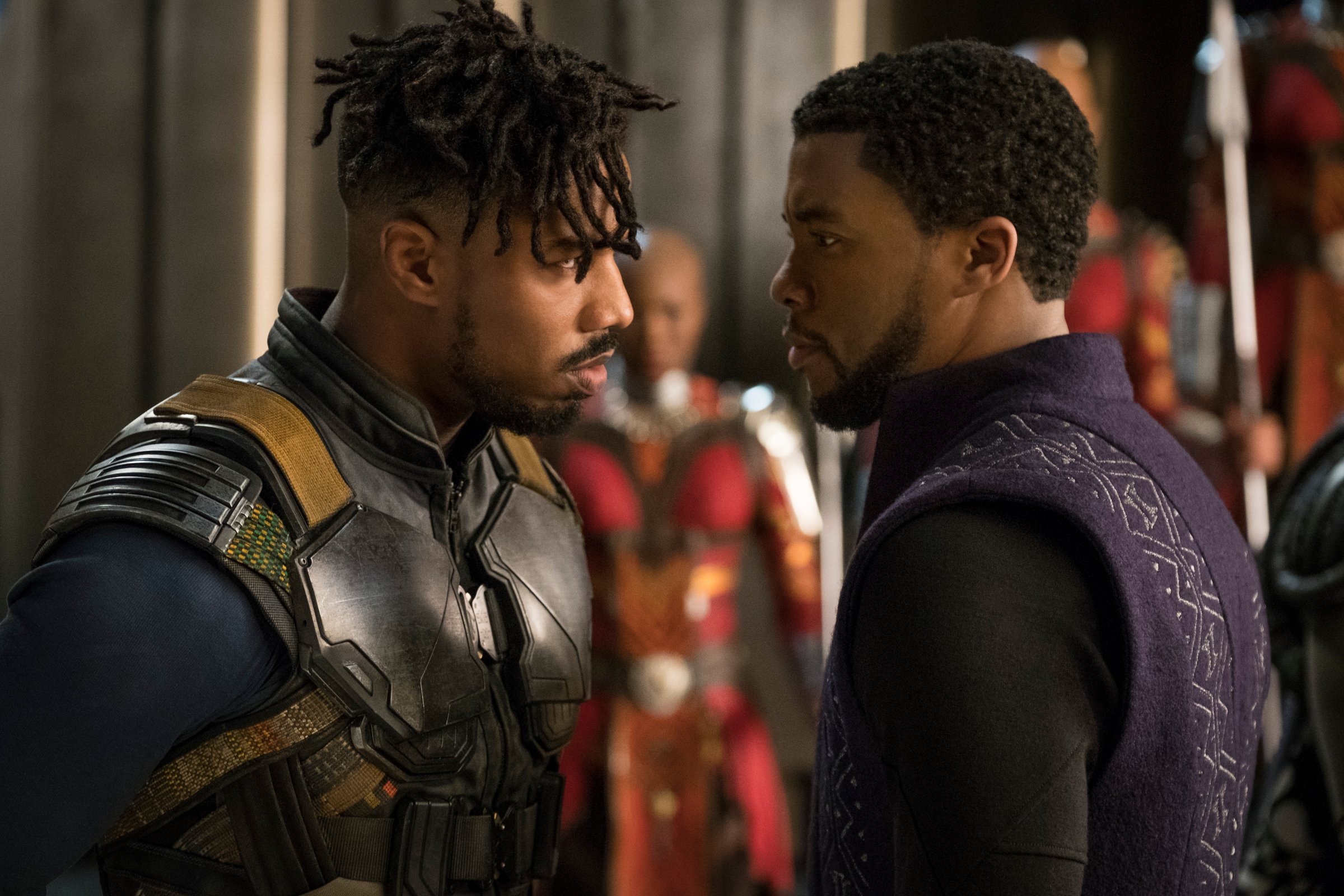
That Marvel’s Black Panther is a runaway hit commercially and culturally is, by now, obvious. The movie, set in the fictional African country of Wakanda, is now the third highest-grossing film in North American cinematic history, having dethroned Titanic earlier this month. Saudi Arabia, which is undergoing something of a Middle Eastern glasnost under Crown Prince Mohammed bin Salman, chose it to be the first movie screened, on Wednesday, to mark the end of the country’s 35-year cinema ban. And the film’s star, Chadwick Boseman, was just named to TIME’s list of the 100 most influential people in the world.
“As the Black Panther, he’s inspiring everyone, but especially black youth, who deserve to see superheroes like them, to show them that truly anyone can be a superhero,” wrote Sean “Diddy” Combs, about Boseman’s role as the film’s titular character, who is also known as T’Challa. “This matters, because it has been a long time coming to see our own superheroes and the power that they can have on all of us in society. Black Panther’s billion-dollar global success has made it a phenomenon, and Chadwick’s role signals a black renaissance.”
Indeed, Black Panther is also heralding another related renaissance: A new wave of interest in Afrofuturism, a literary and musical movement that explores black identity, culture and struggles through the lens of science fiction. From the upcoming blockbuster Avengers: Infinity War — which promises another dose of T’Challa — to live local events, Afrofuturism is everywhere, and its fans say the massive success of Panther is both a catalyst and symbol of the moment.
“The Black Panther movie did a lot of heavy lifting for us,” says author and editor Sheree Renée Thomas, who is organizing an Afrofuturism event in Memphis on Saturday. “Now, I don’t have to do a lot of explaining when I’m discussing Afrofuturism. I can just say ‘Wakanda,’ and people pretty much get it.”
Afrofuturism frequently portrays a future in which black people use technology to become leaders of their worlds, a message that is depressingly absent from most mainstream sci-fi. (Even Star Trek, which famously depicted a racially harmonious future in the late 1960s, didn’t offer a black main protagonist until Deep Space Nine’s Benjamin Sisko appeared in 1993.) Other works are more dystopian, using science fiction tropes to explore the difficulties facing minority groups in the present day.
Afrofuturist themes thus lie at the core of Black Panther, which is in large part a meditation on a black leader’s role in a world largely controlled by white-dominated power structures. Wakanda is an African nation the rest of the world believes to be poor, but is secretly rich, thanks to its hidden deposits of the fictional super-metal vibranium as well as its mastery of technological and scientific advancements. Wakanda’s leaders have long shunned the world stage, mindful of how other African nations’ mineral wealth has been exploited by outsiders in the past. It’s a decision that — spoiler alert — Boseman’s Black Panther eventually chooses to reverse. The move turns Wakanda from an obscure backwater into a global superpower overnight. And with Infinity War promising to bring an existential threat to humankind’s doorstep, Wakanda and the Black Panther are set to play pivotal roles in that struggle for survival too, potentially elevating their status from utter unknowns in the Marvel universe to global saviors.
Thomas says the term “Afrofuturism” is credited to author Mark Dery, whose 1993 essay Black to the Future gave a name to ideas long drawn upon by artists from Sun Ra and George Clinton to novelists like Octavia Butler. It’s also been a major influence on more modern musicians, notably Janelle Monáe, whose albums The ArchAndroid and The Electric Lady (and their corresponding music videos) touches upon themes such as freedom, love and self-identify through science fiction. (The ArchAndoid was in part influenced by 1927’s landmark sci-fi drama Metropolis, which deals with class divisions among a futuristic city’s residents.)
But even if the ideas behind Afrofuturism have been around for decades, Black Panther promises to give them new life across mediums. That’s in part because it’s already introducing the concept to new and massive audiences — this is a movie that made nearly $300 million in its first week alone, after all. And if people who enjoy Black Panther go on to explore other forms of Afrofuturism, they’ll find a wealth of books, comics, graphic novels and music to enjoy, as Thomas points out.
“The main two black writers who come to mind when you think of black science fiction are Samuel ‘Chip’ Delany and the late Octavia Butler,” Thomas says. “And there are writers like Nnedi Okorafor. Not only is she writing for Marvel and continuing the story of the Dora Milaje [Wakanda’s special ops force] in the comic book, but one of her works, Who Fears Death, is being developed into a series by George R.R. Martin. So it’s a lot of great things happening now. And having a blockbuster movie be the face of it does not hurt at all.”
This article was produced in partnership with Spotify as part of its year-long “Black History Is Happening Now” platform. Click here for curated playlists, videos, podcasts and more that celebrate Black achievements and culture beyond Black History Month.
Check out this playlist from Spotify:
Afrofuturism— in all its wild, otherworldly musical dimensions—is captured by guest curators Janelle Monae and Ytasha Womack.
More Must-Reads from TIME
- How Donald Trump Won
- The Best Inventions of 2024
- Why Sleep Is the Key to Living Longer
- Robert Zemeckis Just Wants to Move You
- How to Break 8 Toxic Communication Habits
- Nicola Coughlan Bet on Herself—And Won
- Why Vinegar Is So Good for You
- Meet TIME's Newest Class of Next Generation Leaders
Contact us at letters@time.com